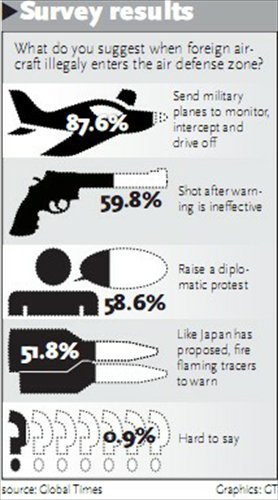HOME >> CHINA
Online opinion poll shows public backs zone
Source:Global Times Published: 2013-11-26 1:23:01

Graphics: GT
The latest Global Times poll showed that nearly 85 percent of respondents believe that China's establishment of its first Air Defense Identification Zone (ADIZ) in the East China Sea is to safeguard its airspace security, while over 90 percent believe that the establishment would push the dispute over the Diaoyu Islands in a direction beneficial to China or at least ease the tensions.
The Chinese defense ministry announced the establishment of the zone on Saturday and issued the aircraft identification rules and an outline of the zone, which triggered opposition from Japan and the US.
The survey, conducted online by the Global Times Global Poll Center on Monday, found that as for the reasons that China set up the zone, 84.1 percent of respondents mention that it aims to safeguard China's airspace security in line with international practices. This is followed by 70.2 percent of them seeing the zone as established to prevent foreign aircraft from getting close to China's coastal areas for spying. The third most referred to reason is to weaken Japan's military edge in the airspace above the Diaoyu Islands, with 67.5 percent of the respondents.
The poll received 1,107 responses. The respondents are aged over 18 and from seven major cities: Beijing, Shanghai, Guangzhou, Chengdu, Xi'an, Changsha and Shenyang.
With the Diaoyu Islands included in China's air identification zone, 53.6 percent of the respondents see China's declaration of the zone will give China an edge in dealing with the island disputes. Some 39.5 percent think that this will create a more stable landscape with an even power struggle formed between China and Japan. Only 4.3 percent of them believe the setup of the zone will do harm to China as it may be used by Japan to play up China's military assertiveness.
More than 20 countries and regions have set up similar zones since the 1950s.
As China's zone overlaps with Japan's to some extent, 50.1 percent of the respondents agreed that the overlapping would increase the possibility of touch-and-go occurrences, while 46.1 percent said that chances of conflicts would go down.
Global Times